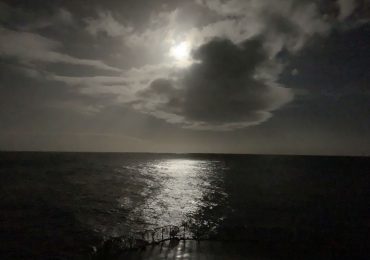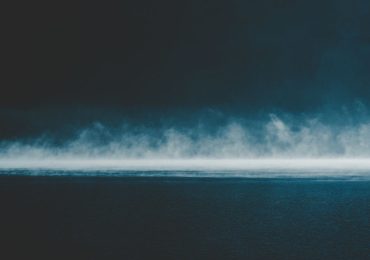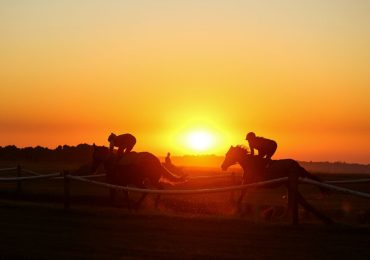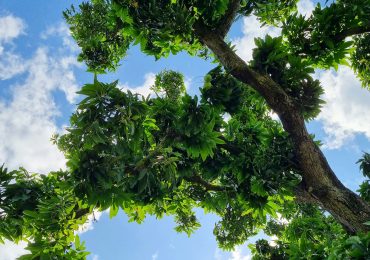The JRB presents a new short story by Stacy Hardy.
The day the white people walked into the sea
As the Holy Spirit says, the impious one, the evildoer, flees even though he not be pursued, for he accuses himself and is rendered pusillanimous and cowardly by his own crime.
—Carlos Fuentes, Terra Norsta
It was clear the day the white people walked into the sea—clear and windless. The sun shone and the sky was blue and far away. At the edge of the beach one woman crumpled. She stood with her heels dug in, swayed and then collapsed in the sand; sat, grabbing fistfuls. I watched it run out between her fingers, dispersed in the air around her. Her hair had come loose, face twisted, eyes staring towards the horizon. Finally, a man knelt beside her. He touched her arm, lightly, at the elbow. I didn’t know if he knew her—a partner or a family member, a brother maybe. He was leaning in close, whispering things. I couldn’t hear what he said—the wind ate his words; sand tore them to fragments. I couldn’t even begin to imagine … there were no words, no comfort to be given, no rational explanation for what had happened—what was happening that very minute. We simply woke that morning and saw it. Every one of us—all four million. Alone in rooms and houses. Each one of us, from behind high walls, as if a veil had been lifted. Even the sunshine that day, how it seemed to flood everything. The curtains in my room were pulled back and I sat blinking, dazzled by those first rays. I could see my face in the wardrobe mirror: empty, emptied. I had become ugly. Everything was distorted, the mouth, the eyes, the skin especially. Scenes flashed before me, my whole history swelled up, splayed open—blood soaked. And in that moment, it was over; our fate decided. It didn’t happen according to the prophecy; we were not driven. It wasn’t fear of death or violence; disgrace drove us. We sneaked out of our houses as thieves and murders, stood blinking in the early morning light. From my doorway, I could see the fence, the tree, the neat walled-in houses of my neighbourhood, and then the people approaching, alone and in small groups. Soon the streets were packed with us, crowds covering blocks and squares. We came from all corners of the country, from inland cities and farmsteads, to join the procession, all the dynasties, stretching back five generations, more even, from the founding of the colony. Those from the interior must have travelled through the night. They parked their cars along the kerb of the road, walked in stony silence, at a steady pace. Groups of men and women, some with children, their bodies receding into the distance. The only sound was the dogs; from behind high gates and deserted yards they barked and howled. I don’t know if the majority witnessed the exodus—did they stand in silent awe or cheer from a distance? I looked back and saw only white faces. It was an ugly view. Tarred streets and colonial-era buildings with decaying facades. Even the sky above us seemed washed out. We followed the road that ran through the industrial area, abandoned cars in rusted junkyards, factory gates and barb wire hemmed us in. A final stretch, then the view opened and I could see the horizon where the land meets the sea; and along the shoreline, at the meeting of sand and sea, those at the front were just reaching the water. Waves ran up then pulled back, leaving a pale foam scrim, as if they were calling. A young man in a windbreaker was the first to go. He seemed vaguely familiar but I didn’t know if I knew him or if it was just the light, how it seemed to flatten things and fill in distinctive features. We all suddenly looked so alike. For the first time not a collection of isolated individuals but a great amorphous mass, a whole population group, whitewashed away. We walked as ghosts, as people who had crossed a limit on a map, no country ahead of us, just an immense stretch of water. I watched the man hesitate and the crowd behind him grew still, waiting. There had been a sea breeze the night before, but now there was nothing except a feeling like something holding its breath. Finally, he took the plunge, stripped off his jacket and surged forward into the waves, the surf. I saw his legs rise, the warm water on his feet and the burst of the first waves against his ankles, still warm but cooler— I knew from having swum here before, often in the late afternoon, when the wind died down completely and the air was merely a shimmer on the surface. I knew when the coldness would hit; just past the surf line where the shallow water mixes with water from the heart of the ocean and the brutal surf that lays ahead of that. More of us began to paddle out. The tide was rising, the waves grew choppy, hemmed in white. My gaze fixed on a small woman, already knee deep. She splashed, trying to swim, but her body was drawn outward, then caught by a wave and sent spinning back in. She was struggling against the tide, gasping for air and going under, now dangerously close to the rocky outcrop that hemmed the beach. I imagined the moment of impact, the sharpness of the boulders against her head, breaking the bones in her ankles and legs, wrists, the swallowing of salt water. I knew what would follow. Her body, starved of oxygen, sinking downward, or washing up, wedged between the rocks for days, rotting slowly. Many of us, I knew, would suffer the same fate. Others would be returned to the beach. There was no saying where—this shoreline or in foreign countries, different seas, distant coastlines. So much depends on the flows and currents, the tides at the moment of submersion. And maybe this would prove a better way to find a country—by chance landing, washing up dead on a foreign beach, just a body, bloated beyond recognition, washed clean of all evidence. I pictured the beach in the morning littered with corpses, from a distance, like tiny whales, beached and bloated. A spectacle of the dead, spat back, as if even the sea rejected us. Finally, black decay would set in—that’s what they call it, the final stage of putrefaction, when the skin itself comes loose, peels away, revealing the rotten muscle beneath it, and then that too would go, until finally only bones, alike in brilliant whiteness, bleached by the salt and the sun, disappearing into the sand dunes. It didn’t matter. We already were dead, standing on the beach, some pale as ghosts, others swimming in slow motion, weighted by history, sapped by the excesses inherited through oppression and violence. The heat was rising on its arc and I was suddenly close. I could feel the sting of salt on my lips, the sea spray cooling my skin. The sand was soft, it held my feet. Lifting them became difficult. I steadied myself by walking in the footprints of another, one that had gone before me. Their stride was bigger, the space between their feet wider—a man maybe. I had to stretch my legs to reach each footfall, yet in this stretching I got closer, arrived sooner, and suddenly the waves were lapping my feet. My toes sank in deeper and then the steps I was following stopped. Everything was quiet. There was only my feet and the water, the sound of the tides rolling in and out. I looked away, looked towards the horizon and pushed myself towards it. My body obeyed, but my mind was spinning. Nothing had changed: the sea, the beach, the sun was warm now, hot even. But everything had changed. The light was stronger, resolute. I swam slowly. I was a good swimmer and I took long broad strokes. The water embraced me. It would have seized me if I had let it, sucked me under, but I held off, hovered treading water, then turned my head, blinking against the salt sting, the glare that rose off the ocean, everything shimmering. The whole world upside down. The sea was the sky; above was below. I craned my neck and my mind began to swim. I glided along then flew upwards towards the sun, the light becoming more brilliant and luminous. The sky above, even higher, between the gauzy clouds, the rays that refracted in tiny rainbows, covering the sand with infinite lines of colour. I saw the country below me, the suburban homes with their doors ajar, bereft of owners, the high walls crumbling, letting light in. The streets were silent but the sky around me was teeming, the gulls of the beach lifting and diving in a feeding frenzy. I flew with them, over the harbour, on towards the city, alive with the sound of music, voices and beats, mingling with the salty smells of braaied meat and roasting corn. Still further, beyond the city limits. The countryside suddenly so much bigger, infinite even. A landscape of rolling hills and valleys, farmlands and homesteads, and then the endless ochre plain of the bushveld, alive now with animals, the lion, hyena, rhino, elephant, and antelope—all the animals and insects; the shifting gazes of a million life forms spreading their light into the dark contours of this country as if they’d been in hiding, lying in wait for this moment. I looked as long as I could, then with newfound commitment I plunged in, following the swell of the breakers, waves of foam rising then vanishing in a dizzying spray. The blinding whiteness stung my eyes. I opened then closed them, gave my body over to trembling limbs, arms and legs that twisted around me, ghosts of the dead at sea, the hands of slaves and refugees seizing my ankles and drawing me towards them, downward, towards the complete blackness at the bottom of the Indian Ocean.
- Stacy Hardy is a writer based in Grahamstown, South Africa. She is an editor at the Pan-African journal Chimurenga, a founder of Black Ghost Books and a teacher at Rhodes University. Because the Night, an anthology of her fiction, was published in 2015 by Pocko Books, London. She is currently working on a new collection that explores the intersection of the human body and the body of text via the tropes of disease and animality.






One thought on “New short fiction: ‘The day the white people walked into the sea’ by Stacy Hardy”